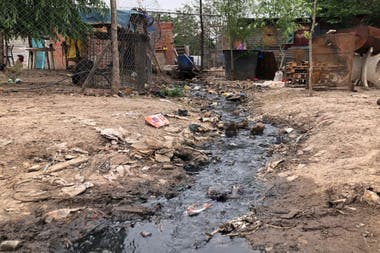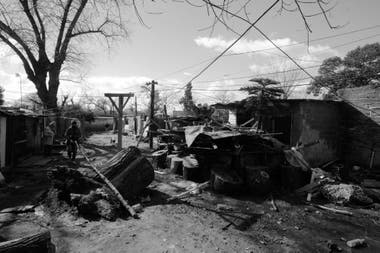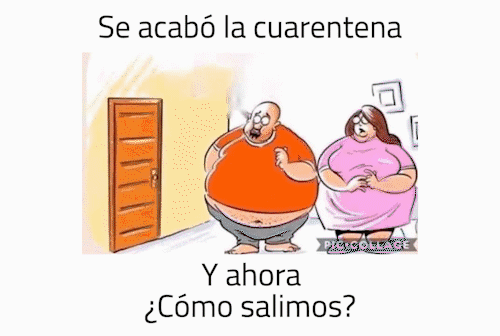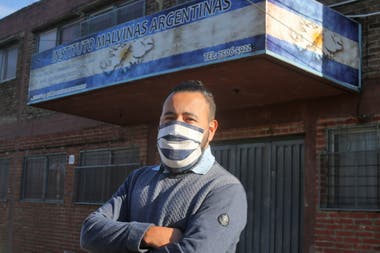“He is a black villager”; “She is a black woman”; “they are black heads”; “They’re shitty niggers.” From time to time, the reactions generated by some news related to the poverty or to the reality of popular neighborhoods and settlements are in charge of reminding us that the racism in Argentina it is not always linked to skin color.
Today, there is increasing agreement in considering discrimination for socioeconomic reasons as another form of racism, not only because, tacitly or explicitly, it establishes categories of individuals but also because it endorses and promotes practices that violate rights and promote exclusion.
“We can’t breathe here either.” How racism operates in Argentina
The National Institute against Discrimination, Xenophobia and Racism (Inadi) has been talking for years about this specific type of racial discrimination. Calls it socioeconomic racism. It is, according to the organism, a type of racism that, at a social level, is expressed through different myths and prejudices installed in the popular imagination with a force that we are not always able to recognize. But its impact is not merely discursive. Those who suffer from it often speak of “discrimination based on face bearing“, of” exclusion “as subjects of law and of” being victims “of a almost permanent state of suspicion.
In the report “Understanding discrimination”, released by the agency, it is argued that “the relationship between racism and poverty becomes evident when expressions associated with classic biologicist racism (‘they are blacks’) or cultural racism are heard, for For example, devaluing the habits and tastes of the popular classes. ” In this way, prejudices that fall on the population living in poverty are evident in statements such as: “they are all lazy, they do not want to work”, “they like to live in crowded conditions”, “what they earn they spend on alcohol”, etc. In addition, it is explained that “the ideological process of criminalization of poverty, a stigma with a great presence and validity in the world today, has a strongly racist and discriminatory matrix.”
With his 27 years, Brian Landriel, knows well this variant of racism. A native of a humble neighborhood in Bernal Oeste, he has suffered it in more than one chanceEither when trying to get a job, when wanting to enter a bowling alley, or when running into the police. “I know that if I am walking down a street and a patrol car passes, the safest thing is to stop to ask me for documents Although I am not doing anything wrong, “he maintains. And he affirms that this situation happens regularly in the Lanús train station.” The same police officers stop me every time. And when they stop you, they treat you badly, they assume you’re a drug addict And maybe you’re coming back from a dining room where you help out or from playing soccer with your friends. It is ugly, it gives you a fight because it is unfair, “he acknowledges.
In recent days, Amnesty International published a report that reveals more than thirty cases of institutional violence and excessive use of force since the beginning of the quarantine. It lists, among others, the murder of Luis Espinoza in Tucumán, the violence unleashed against the Qom community in Chaco, and the disappearance of Facundo Astudillo Castro in Buenos Aires. But it also includes cases that occurred in Chubut, La Pampa, Mendoza, Santiago del Estero, Santa Cruz and the City of Buenos Aires.
“The organization is particularly concerned that most of the cases occurred in contexts of vulnerability and / or poverty. The exercise of the powers of control of the security forces must not translate into cruelty or discipline of people or groups who are in a situation of social vulnerability, “the Amnesty International statement stated.
Myths and prejudices
A national survey conducted last year by consulting firm Voices! for LA NACION, it revealed that 77% of Argentines believe that poor people suffer discrimination. The idea that poor youth are violent and abuse drugs and alcohol is one of the most ingrained prejudices in our society around poverty: it is shared by more than half of the population (58%). It is followed by the assumption that poor people do not work enough to get out of poverty (54%). But there is more: that people who live in the villages do better than one because they do not pay for services, that they have more children to receive more assistance from the State, among others.

Prejudices Fear, hunger, villa and guilt: this is how Argentines define the poor
“By living in a settlement it is taken for granted that you live on top or better than others. That is a mistake. They put us prepaid meters, that is, they charge us in advance for the service “explains Araceli Ledesma, the main reference of the Work Table of the Luis Lagomarsino Neighborhood, a nucleus of humble houses with many dirt streets, settled for decades on the border between Pilar and Escobar . “On the other hand, people who do not have regularized services have much more economic expenses,” he adds. On the one hand, by the loss of appliances due to dips and power surges. We also lose our houses because they burn us when using candles to illuminate us, mainly in winter. “
In Ledesma, stomach problems are more than frequent in most popular neighborhoods because they do not have drinking water. The wells from which they draw water for drinking and cooking are usually a few meters from the blind wells, since they don’t have sewers either. In the case of the Lagomarsino neighborhood, the location creates additional problems. “All the waste from the municipality comes to our neighborhood because, for 15 years, a sewage treatment plant“Explains the woman, who denounces that, since then, not only bad smells abound but also health problems such as furunculosis or dermatitis.” We do not live from above. Not at all. We live from the bottom to the bottom. I would invite those who prejudge to put themselves in our shoes. Can anyone really think that we live better for not paying for services? “
Prejudices towards people living in poverty they are not recent. According to historian Ezequiel Adamovsky, the class division was always supported by notions of racial hierarchy in our country. Therefore, all value judgments about poverty are racialized, even if the person in question does not have a dark complexion. “Towards the end of the 19th century, the prejudices that hitherto fell on the Afro community were extended to poor people. There comes the use of ‘black’ as an insult. There is also a long-standing anti-indigenous prejudice and the habit of discrediting the poor for alleged moral vices: ‘he is lazy’, ‘he drinks a lot’, ‘he has no foresight’, etc. “, Adamovsky points out.
According to the specialist, also a professor at Unsam and a researcher at Conicet, throughout the 20th century and so far into the present, racism for socioeconomic reasons has had peaks of recrudescence, which always coincided with a greater political prominence of that group. One of the most recent peaks was recorded after the 2001 crisis, with the emergence of the piquetero movement. Although there, Adamovsky also detects another phenomenon: “Until then, the idea persisted, especially in the middle class, that if you worked and did not have vices, you would not be poor. But the 2001 crisis put that in check. discourse, eroding all certainties. It is not by chance that, in this context, racism intensified, “he maintains.
“Accident of birth”
In his article “Myths about poverty”, the sociologist and economist Bernardo Kliksberg disarms the assumption that he maintains that the responsibility of living in poverty belongs to the poor because they do not work enough to get out of it. According to his specialist: “behind the myth there is an implicit one: poverty would be a problem of individual behaviors. If these traits were overcome, it would disappear”. However, in his view “many of the poor are living in ‘poverty traps‘. In societies as unequal as those in Latin America, the ‘birth accident‘”, he points out.
In the aforementioned document, Kliksberg also explains that a child born in a poor home will be exposed to more severe health risks and that, in many cases, they will work from an early age. “If there are no active public policies that break the” poverty traps “, probably the family groups that conform they will play similar destinations“, says the specialist.

The facts of reality they also undermine that myth. According to the report “Radiography of youth in Argentina”, prepared by the Observatory of the Argentine Social Debt, young people from the marginal working class have 10 times more chances of not having social, mutual or prepaid work than the richest; seven times more likely not to study or work; six times less opportunities to have personal projects, and three times more likely to experience a structural social support deficit.
“The poor are something like the disposable material of capitalist society “, reflects Emilio Seveso, doctor in Social Studies of Latin America and professor at the National University of San Luis, for whom” unconscious reasons are played on the people who discriminate against them, which make the discriminatory act others naturalized, but at the same time they rationalize that act, justifying it with certain assumptions about poverty “.
Seveso, also an assistant researcher at Conicet, does not rule out that one of the factors that come into play in the act of discrimination has to do with the fears that poverty generates. “Poverty conjures up all social fears, which are being updated. Just as in 2001 the fear was of falling into poverty, today it has more to do with insecurity, “he adds.
Beyond the reasons that cause it, all specialists agree that the action of discriminating for socioeconomic reasons it is not innocuous. Especially when it becomes systematic and shared. “Among the poor there is a kind of accustoming – Seveso acknowledges -. They tell you: ‘I don’t care’, but that ‘I don’t care’ talks about that they are used to it, it does not imply that the actions have no effect. Systematic aggression it becomes part of who I am. The kid who wears a cap tells you: ‘I can’t get a job’. The discomfort persists, but it is clotted because otherwise it would be unbearable. “
.
Publicado en el diario La Nación




